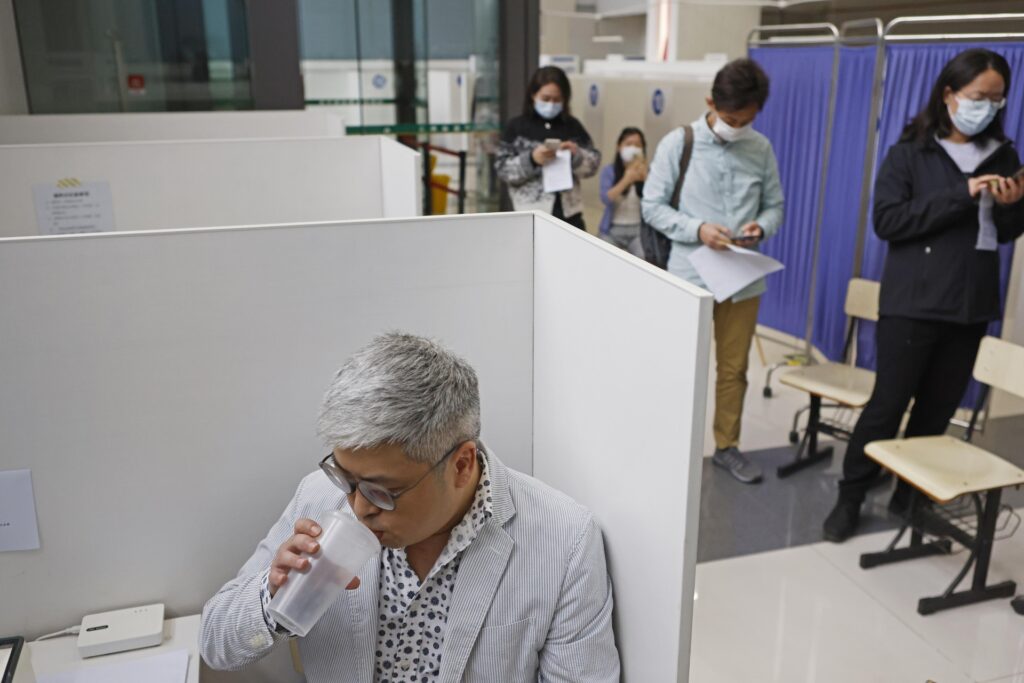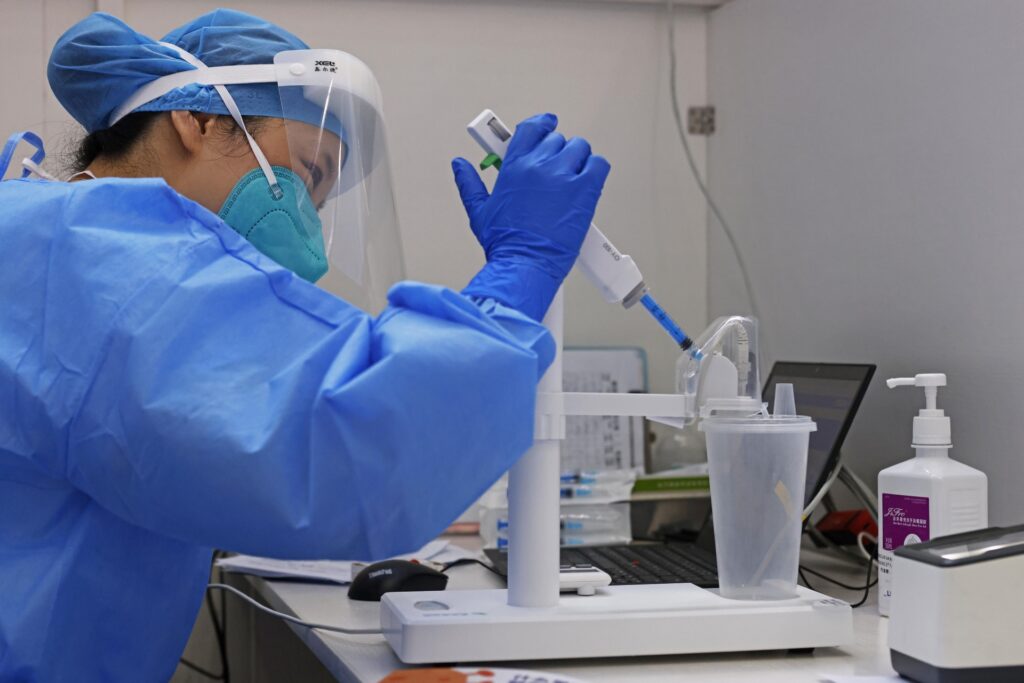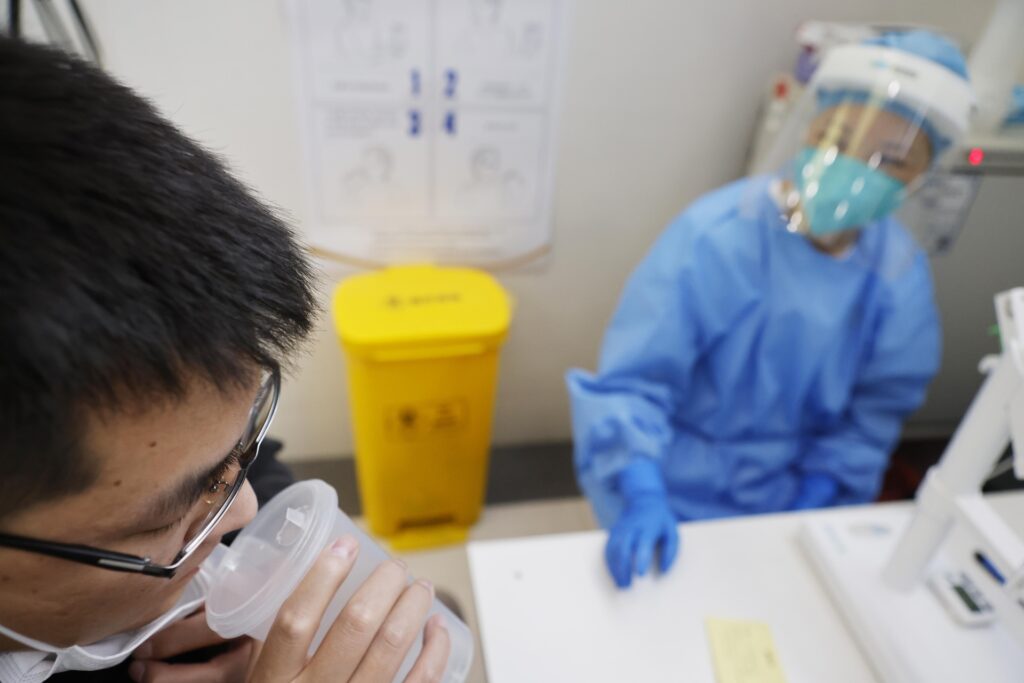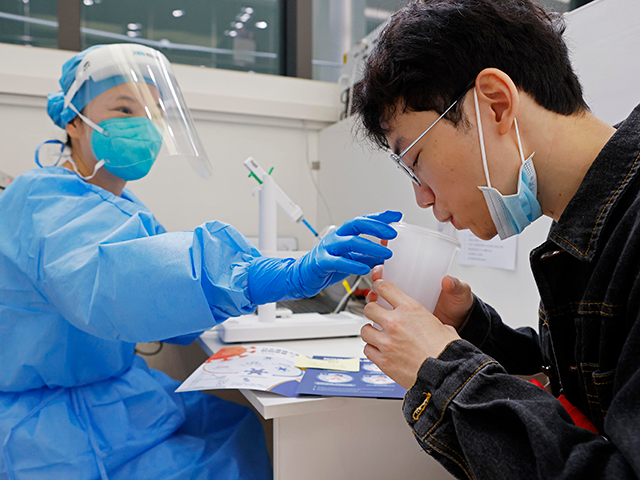The city of Shanghai on Tuesday began dispensing aerosolized booster shots for China’s woefully ineffective coronavirus vaccine products, a technique meant to make booster doses faster and more palatable to the population than traditional injection methods.
The system being field-tested in Shanghai asks subjects to breathe deeply from a cloud of medicated gas contained in what looks like a sippy cup.
China’s vaccine candidates, initially produced by Sinopharm and Sinovac, were developed using older “inactive virus” technology instead of the mRNA tech used by the major Western vaccine products. Despite copious promises from Chinese Communist politicians and dubious clinical studies, these products proved substantially less effective than Western vaccine candidates in the field, which is one reason the authoritarian country wound up with relatively low compliance rates despite strong official encouragement for citizens to get their shots.
China’s pandemic response is oppressive in most respects, but one aspect in which Beijing could claim to be less authoritarian than many governments in the free world is that it has not mandated vaccine product compliance.
Chinese Communist leaders began admitting some of these deficiencies recently to justify their continuing use of brutal district and citywide lockdowns to contain coronavirus surges.

A resident takes inhaled booster vaccination on October 26, 2022 in Shanghai, China. (Yin Liqin/China News Service via Getty Images)
The regime continued to urge citizens to get shots, however, and is attempting to produce mRNA vaccine products that might be more effective than the older products. Some outside analysts think the Chinese government is growing increasingly fervent for vaccination and boosters because its lockdown policies left its vast population with far less natural immunity to Chinese coronavirus than other large countries, leaving China stuck with seemingly endless coronavirus surges and lockdowns while the rest of the world moves on from the pandemic.

A medical staff aerosolizes coronavirus vaccine on October 26, 2022 in Shanghai, China. (Yin Liqin/China News Service via Getty Images)
One of the newer and seemingly more effective Chinese vaccine products is a single-dose product manufactured by CanSino Biologics, approved for use on an emergency basis by the World Health Organization (W.H.O.) in May 2022.

A resident takes inhaled booster vaccination on October 26, 2022 in Shanghai, China. (Yin Liqin/China News Service via Getty Images)
Pharmaceutical companies around the world have been working on developing inhalable boosters to reduce public resistance to repeated injections. CanSino sought to steal some thunder by rushing the first inhalable booster to market with assistance from the People’s Liberation Army Academy of Military Medical Sciences, which the Biden administration placed on an export blacklist in December 2021 for using biotechnology to develop physical and psychological weapons.
The CanSino inhalable arrives several months ahead of a nasal vaccine product developed in the United States and under production by Indian vaccine giant Bharat Biotech.
Unlike most of the other inhalable boosters under development in other countries, the Chinese system has users biting down on the end of a sealed container, inhaling the aerosolized vaccine product through their mouths instead of their noses, and holding their breath for five seconds to let it take effect. The entire booster-mist procedure takes about 20 seconds to complete, a major improvement in efficiency over injectables.
Under both the CanSino system and others under development, the inhaler system can only be employed to administer boosters. The initial ingestion must still be administered by shots.
China’s state-run Global Times reported a brisk pace of sign-ups for the new booster technology from residents of Shanghai, who suffered through one of the worst lockdowns last summer and are understandably nervous about repeating that ordeal.
Subjects who tested the mouth inhaler system said the experience was not unpleasant, comparing it to drinking bubble tea, while Chinese scientists insisted the vaccine mist was every bit as effective as receiving an injection:
Research shows that respiratory droplets and close contact transmission are still the main transmission routes of the SARS-CoV-2. The aerosolized vaccine could stimulate immunity on the respiratory mucosa, the “first point of contact” between the body and the virus, which is like putting an “invisible mask” on the inhaler, the company said in a statement to the Global Times.
Clinical trials proved that the aerosolized vaccine is safe and highly immunogenic in inhalers, according to the company.
Studies showed that six months after inoculation with two doses of inactivated vaccine, the level of neutralizing antibodies against the Omicron mutant strain in people receiving the aerosolized Ad5-nCoV as booster shots is 14 times than that of those receiving homologous boosters, and six times than that of people receiving intramuscular Ad5-nCoV, the company said.
The Global Times noted that Chinese manufacturers have yet to produce a booster that would be effective against the highly contagious Omicron variant of Chinese coronavirus, which is the strain of greatest concern in most Chinese cities at the moment, but claimed Sinopharm, Sinovac, and CanSino have all “made progress on Omicron-specific vaccines.”

COMMENTS
Please let us know if you're having issues with commenting.